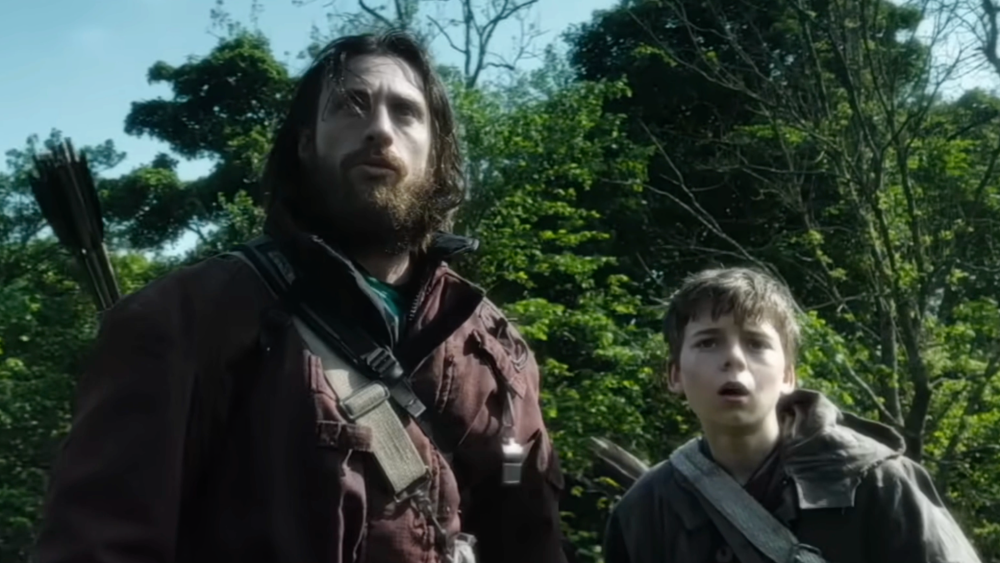When the first trailer arrived for “28 Years Later,” the third installment in Danny Boyle and Alex Garland’s masterful “28 Days Later” series of horror films, it was scary, filled with gruesome images of zombies and a dystopian world.
But what makes the trailer even more terrifying is an eerie, rhythmic chant by a high, nasal voice, moving with a military cadence, monotonal at first but growing increasingly louder and more agitated as it goes on, with the images and ominous musical backdrop growing in speed and intensity as it progresses.
Somehow, in that context, the chant, even though the words seem unrelated to the images, is absolutely horrifying, like a deranged rap song. Its use in the film makes an ominous scene even more ominous.
The chant is actually “Boots,” a poem by Rudyard Kipling, first published in 1903 and intended to convey the maddening monotony of soldiers marching; the direct inspiration was the hundreds of miles British soldiers were forced to march across southern Africa in the Second Boer War around the turn of the last century, according to the Kipling Society.
The recording used in the film is nearly as old as the poem itself, voiced in 1915 by actor Taylor Holmes. It is a dramatic reading that starts off militaristic as the initial lines set the scene, but his voice is patently hysterical by the end, even as it follows the lock-step rhythm of the first five syllables:
“I—have—marched—six—weeks in hell and certify
It—is—not—fire—devils, dark, or anything,
But boots—boots—boots—boots—movin’ up and down again,
And there’s no discharge in the war!
Try—try—try—try—to think of something different
Oh—my—God—keep—me from going lunatic!”
Unusually for something featured so prominently in a trailer, the poem plays a very small, although foreboding, role in the film — buttressed with an eerie bass synthesizer, it soundtracks Spike and his father walking to the mainland, which is thick with infected zombies, and presumably conveys that they’re marching to war.
But out of everything that could have been used to deliver that message, why a 110-year-old recording of a poem that dates back to the peak of the British Empire? Boyle explained in an interview with Variety last week.
“We had all these archives that we wanted to use to suggest the culture that the island was teaching its children,” he says. “It was very much a regressive thing — they were looking back to a time when England was great.
“It’s very much linked to Shakespeare,” he continues. “For those who know the ‘Henry the Fifth’ film, there’s a very famous speech, the Saint Crispin’s Day speech, which is about the noble heroic English beating the French with their bows and arrows. We were searching for a song, for a hymn — for a speech, actually. We did think about using the Crispin’s Day speech at one point, but that felt too on the nose.
“And then we watched the trailer — Alex and I remember it vividly — the first trailer that Sony sent us, and there was this [recording] on it, and we were like, ‘Fucking hell!’ It was startling in its power. It was used very effectively.
“The trailer is a very good trailer, but there was something more than that about that [recording], about that tune, about that poem. And we tried it in our archive sequence, and it was like it was made for. it”
A rep for Sony wasn’t immediately able to pinpoint the person who chose the chant for that trailer, but it was so effective that Boyle was quick to incorporate it into the film.
“It’s like a reverse osmosis,” he says. “It came into the film and seemed to make sense of so much of what we’ve been trying to reach for.”
He also notes that Kipling’s words and Holmes’ voice, echoing across the decades in a context neither ever could have imagined, somehow take on a new power in today’s context.
“You have to hold your hand up and say, ‘How is it that something that’s recorded over 100 years ago has that same visceral power that it’s always intended to have?’ And I think it was always intended to have that power and it still maintains it. In a TikTok world, it still has that impact. It’s amazing.”
Additional reporting by Bill Earl.
Read the full article here



